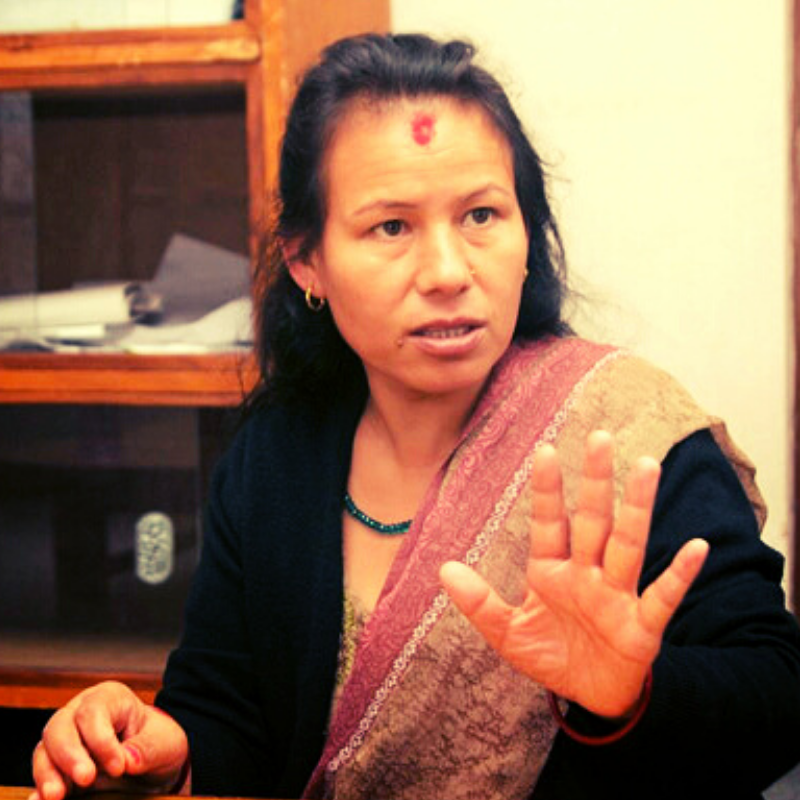Nos actualités
Interview with our partner: Charimaya Tamang

Publié le 8 March 2021
Charimaya Tamang embodies resilience and fighting spirit. After a difficult childhood in Nepal, her life changed completely when she reached the age of 16. Drugged, then captured, she was taken by force to Mumbai (India) by sex traffickers who forced young girls to prostitute themselves in a brothel. A nightmare that will last 22 months, before it is delivered by the Indian government.
Ms. Tamang does not see this painful memory as a handicap, but as a strength. Over the years, she has become an icon for survivors of sexual exploitation, and has used this experience to help victims of this form of slavery.
Awarded several times for her struggle, her association, Shakti Samuha, with whom we have been working for several years (see our current project in Nepal) is alsothe first in the world to be led by survivors of sexual exploitation, a progress that motivates her all the more to continue her efforts.
Even though she came out of it with flying colors, Ms. Tamang regrets that sexual exploitation is a worldwide phenomenon, and so difficult to eradicate. She is indignant about this form of modern slavery that destroys the lives of young girls and robs them of their dignity:
« This should not happen anywhere…This should not happen anywhere in the world! It is a violation of fundamental human rights (…) »
Indeed, the problem of sexual exploitation lies entirely in the fact of treating a human being as an object. No individual should have to fight for the simple respect of his person. Yet victims of sexual exploitation have no choice but to fight for their lives. To this difficulty, Charimaya Tamang adds the taboo that still reigns over sexual exploitation in Nepal.
“It’s very uncommon to talk about it. Maybe in specific and limited contexts like in NGOs or with social workers. But as far as victims are concerned, it’s still difficult to explain it and talk about it in all its forms, especially for those who have experienced it.”
The proof is that when she was reduced to prostitution in India, and even after her release, Charimaya Tamang and other survivors were not welcomed with open arms in Nepal. On the contrary, they were seen as ‘disease carriers’ and even condemned for what had happened to them. Despite this social violence, both in terms of stigmatization and exclusion, Ms. Tamang did not give up She has used all of these experiences to understand the concept of resilience, and how to deal with adversity.
“I have witnessed sexual exploitation firsthand, I have lived it. But having vulnerabilities doesn’t mean our lives are over. Everyone has challenges and weaknesses. What we need to do is seek to learn from them, and fight again and again.”
A philosophy according to which difficulties, once overcome, would have a specific role: to teach us to fight and learn from the past. In this multitude of ordeals, Mrs. Tamang was still able to meet benevolent people who helped and supported her in her projects. A support, which allowed her to get back on track, and to progressively abandon her status of ‘victim’, for that of ‘survivor’.
“You know, Life is full of struggles and we have to work on this path continuously and relentlessly…Look at me, when I started this path 20 years ago, if I hadn’t dedicated myself full time to my continuous efforts, I wouldn’t have so many friends today. If we keep fighting and never give up, it gives visibility to our work and it keeps us focused on one direction, one specific goal.”
Ms. Tamang has led this struggle relentlessly. But despite her best efforts, the activist refuses to keep all the credit to herself. Many people have sown in her, and allowed her to be the person she is today. She talks about her older brother, who always encouraged her to go to school as a child.
« It was very important and necessary for everyone. In my village, at that time, it was the time when education for girls, even for boys, was not available…or at least, not in my culture. Thanks to the encouragement and initiative of my brother, today I am the person I am. All credit goes to my brother as well.”
One does not become a hero alone, and even less in one day. Translation Result Select target language English (USA) One does not become a hero alone, and even less in one day. It is a long process, often painful, but once tamed, it can save thousands more lives. In our fight against sexual exploitation, stories like these keep us believing in our efforts and turn the most traumatic experiences into inspiring stories for others, and most importantly, for the victims.
Find the activities of the association Shakti Samuha :Shakti-Samuha | Home
Written by Robine Bonsenge, Communications Officer
